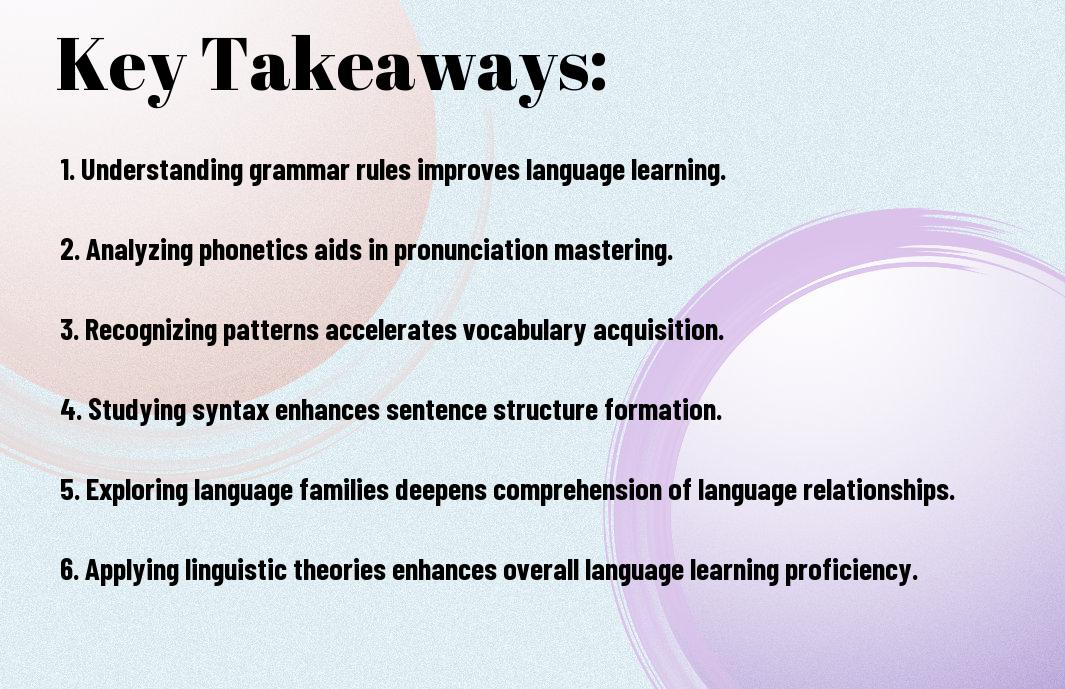There’s a substantial advantage to delving into linguistics when launching on the journey of learning a new language. Understanding the underlying structures, patterns, and rules that govern languages can significantly enhance your ability to grasp new linguistic concepts and apply them effectively. By studying linguistics, you’ll gain a deeper insight into how languages function, which will equip you with the tools to navigate the complexities of acquiring a new language with confidence and proficiency.
Key Takeaways:
- Understanding language structures: Studying linguistics can help learners recognize patterns in different languages, making it easier to understand and learn new languages.
- Improving language learning strategies: Knowledge of linguistics concepts such as phonetics, syntax, and semantics can guide language learners in adopting effective study techniques and strategies.
- Enhancing communication skills: Linguistics provides insights into how languages work, enabling learners to communicate more effectively and accurately in various languages.


The Building Blocks of Language
Phonetics and Phonology: Decoding Sounds
Language starts with sounds. Phonetics and phonology focus on the study of speech sounds and patterns. By understanding the intricacies of phonetics, you can improve your pronunciation and accent in a new language. Learning phonetics can help you differentiate between similar sounds that may not exist in your native language, giving you a better grasp of the language you are learning. Moreover, mastering phonetics can also enhance your listening skills, as you become more attuned to how words are pronounced.
Morphology: The Structure of Words
Structure is crucial in language. Morphology, the study of how words are formed and their internal structure, plays a significant role in language learning. By delving into morphology, you gain insights into how words are constructed, including prefixes, suffixes, and root words. Understanding morphology can help you decipher the meanings of unfamiliar words by breaking them down into their constituent parts. This knowledge allows you to expand your vocabulary more efficiently and comprehend the intricate connections between words in the language you are studying.
This deep examine morphology equips you with the tools to not only decipher new words but also to create your own. As you grasp the foundations of morphological rules and word formation, you can apply this knowledge to enhance your language skills and express yourself more effectively in the language you are trying to master.
Grammar and Syntax
Clearly, studying linguistics can greatly aid you in learning new languages. By understanding the principles of grammar and syntax, you can decipher the rules that govern how words are organized and structured in a sentence. This knowledge allows you to grasp the nuances of sentence construction and word order, which vary across languages. If you are interested in delving deeper into why studying linguistics is beneficial, you can check out Why Study Linguistics?
Sentence Structure and Word Order
With a foundation in linguistics, you can analyze the sentence structure and word order of different languages more effectively. This understanding enables you to comprehend how changing the arrangement of words can alter the meaning of a sentence. By comparing and contrasting the syntax of your native language with the language you are learning, you can identify patterns and draw parallels that aid in your language acquisition journey.
Tense, Aspect, and Mood: Unraveling Complexity
Word order is just the tip of the iceberg when it comes to grammar and syntax. Tense, aspect, and mood are crucial elements that influence how verbs function in a sentence. By studying linguistics, you can unravel the complexity of these aspects and understand how they impact the meaning and structure of sentences in different languages. This knowledge equips you with the skills to navigate the intricacies of verb conjugation and sentence formation.
Understanding the intricacies of tense, aspect, and mood can be challenging, but with a linguistic perspective, you can break down these concepts into digestible parts. By grasping the rules and patterns that govern these elements, you can enhance your ability to communicate accurately and fluently in a new language.
Semantics and Pragmatics
Now, let’s investigate into the fascinating fields of semantics and pragmatics in linguistics, which can greatly aid you in learning new languages.
Meaning-Making: Words, Context, and Culture
One of the fundamental aspects of semantics is understanding how meaning is constructed through words, context, and culture. By studying semantics, you will learn how words convey specific meanings based on linguistic structures and cultural norms. This knowledge will help you navigate the nuances of language use in different cultural settings, making your language learning journey more nuanced and effective.
Implicature and Inference: Beyond Literal Meaning
Words do not always convey just their literal meanings. In this subsection, you will explore implicature and inference, which are crucial aspects of pragmatics. Understanding implicatures – the implied meanings beyond the literal interpretations of words – and inferences – the logical deductions made based on the context – will elevate your language comprehension skills. By grasping these concepts, you will be able to decipher hidden meanings, jokes, and metaphors in a new language more effectively.
In the subsection on Implicature and Inference: Beyond Literal Meaning, you will learn how to look beyond the surface meaning of words and recognize the underlying messages conveyed through language use. This skill is crucial for becoming a proficient language learner, as it allows you to understand the subtle nuances and implied meanings in conversations and texts.
Language Acquisition and Development
Despite Why Study Linguistics? – Department of Linguistics, many people still underestimate the importance of linguistics in aiding language learning. Understanding how languages are acquired and developed can provide valuable insights for learners. By delving into the mechanisms that underlie language acquisition, you can gain a deeper appreciation of the complexity and nuances of the languages you are trying to learn.
How Children Learn Language: Insights for Adults
The process of language acquisition in children offers valuable lessons for adult language learners. Children effortlessly pick up languages through exposure and interaction with their environment. They learn to distinguish sounds, recognize patterns, and internalize grammar rules naturally. As an adult learner, observing and understanding these natural processes can help you adapt your learning strategies. Emulating the immersive environment that children experience can enhance your language learning journey.
Language Contact and Change: The Role of Environment
Acquisition of a new language is influenced by the environments in which you immerse yourself. The contact between languages in multilingual settings can lead to linguistic changes and adaptations. Exposure to diverse linguistic environments can enrich your understanding of language structures and facilitate language learning. By recognizing the role of environment in language contact and change, you can strategically choose environments that support your language learning goals.
Learn how language contact in multilingual settings can introduce new vocabulary, alter pronunciation, and shape grammatical structures. By engaging with diverse linguistic environments, you can expand your language repertoire and enhance your proficiency. The dynamic nature of language contact highlights the importance of cultural immersion and interaction in language learning.

Cognitive Benefits of Linguistic Knowledge
Improved Memory and Attention
Unlike studying other subjects, delving into linguistics can significantly improve your memory and attention. By learning the intricacies of different languages, you are constantly engaging your brain in recognizing patterns, memorizing vocabulary, and understanding complex grammar rules. This mental exercise helps strengthen your memory retention capacity and enhances your ability to focus on tasks.
Enhanced Problem-Solving and Critical Thinking
Improved linguistic knowledge can also lead to enhanced problem-solving and critical thinking skills. When you study linguistics, you analyze language structures, syntax, and semantics, which require you to think logically and critically. This analytical thinking can be applied to various real-life situations where you need to solve problems or make decisions.
Enhanced problem-solving and critical thinking skills acquired through the study of linguistics can benefit you in various aspects of your life, such as academic pursuits, professional endeavors, and even personal interactions. The ability to think analytically and solve complex issues is a valuable skill that can set you apart in many situations.
Applications in Language Learning
Identifying Patterns and Anomalies
On your language learning journey, studying linguistics can help you identify patterns and anomalies within the language you are learning. By understanding the underlying structures and rules of grammar, phonetics, and syntax, you can make connections that may not be immediately obvious. This analytical skill can assist you in recognizing common language patterns, which in turn can make learning new vocabulary and grammar rules more intuitive and efficient.
Developing Effective Language Learning Strategies
Language learning involves more than just memorizing vocabulary and grammar rules; it requires effective strategies to immerse yourself in the language and culture. By leveraging your understanding of linguistics, you can tailor your learning approach to suit your individual needs. Linguistics can provide insights into how languages are acquired and processed, enabling you to optimize your learning methods to enhance comprehension and retention.
Another benefit of incorporating linguistics into your language learning journey is the ability to better comprehend the nuances of a language. Learning about phonology, morphology, and semantics can deepen your understanding of how words are formed and interpreted in context. This advanced knowledge can give you a competitive edge in mastering new languages with accuracy and fluency.
Final Words
Presently, studying linguistics can greatly aid you in learning new languages. By understanding the structures, patterns, and rules of language, you will have a more solid foundation when approaching a new language. Linguistics can provide insights into how different languages are related, helping you recognize similarities and differences that can facilitate the learning process. Additionally, studying linguistics can enhance your phonetic awareness and help you grasp unfamiliar sounds more easily, enabling better pronunciation in your target language.
Overall, delving into linguistics can not only broaden your linguistic comprehension but also improve your language learning skills. So, if you are eager to explore new languages and expand your cultural horizons, consider incorporating linguistics into your language learning journey – the benefits are boundless. Happy learning!
Q: How can studying linguistics aid in learning new languages?
A: By studying linguistics, individuals can gain a deeper understanding of language structures, which can help them identify patterns and rules in the language they are trying to learn.
Q: What aspects of linguistics can be particularly helpful in language learning?
A: Phonetics and phonology can be beneficial in improving pronunciation, while syntax and morphology can assist in understanding sentence structure and word formation in the target language.
Q: Can studying linguistics enhance language learning strategies?
A: Yes, studying linguistics can provide learners with a toolkit of language learning strategies and techniques based on scientific principles, making the language learning process more efficient and effective.

